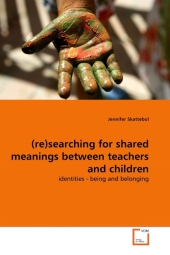 Neuerscheinungen 2010Stand: 2020-01-07 |
Schnellsuche
ISBN/Stichwort/Autor
|
Herderstraße 10
10625 Berlin
Tel.: 030 315 714 16
Fax 030 315 714 14
info@buchspektrum.de |

Jennifer Skattebol
(re)searching for shared meanings between teachers and children
identities - being and belonging
2010. 260 S.
Verlag/Jahr: VDM VERLAG DR. MÜLLER 2010
ISBN: 3-639-28461-5 (3639284615)
Neue ISBN: 978-3-639-28461-4 (9783639284614)
Preis und Lieferzeit: Bitte klicken
How do children fashion themselves as citizens? How do they make friends, establish belonging and become participatory citizens in a broader society that entitles some and excludes others? This book explores how a group of children and their teachers built inclusive communities and developed pedagogical practices which recognise children´s agency and citizenship. Traditional pedagogies suppressed the engagement with politics in early years education and valorised images of the child as innocent´. This study traces the limitations of this view of children and of authorised early childhood pedagogies. Through a fine grained analysis of children´s interactions, this study uses theory from Butler and Bourdieu to reconceptualise children´s constructions of their identities and their sense of belonging and community. This detailed account of praxis illustrates how a group of educators engaged local politics in spite of the challenges this offered to their positioning of teachers as apolitical, non- interventionist facilitators. Listening to children´s ideas for community is a powerful tool for building democratic strategies and visions.
Jen Skattebol, Dip Ed (EC), B.Ed., PhD, Social Policy Research Centre. University of New South Wales, Sydney Australia. Research interests: collaborative practitioner research, social inclusion, Indigenous/non-indigenous relationships, young people, low income families with young children.


